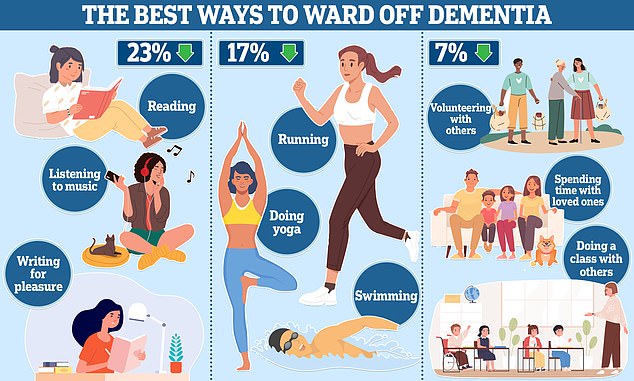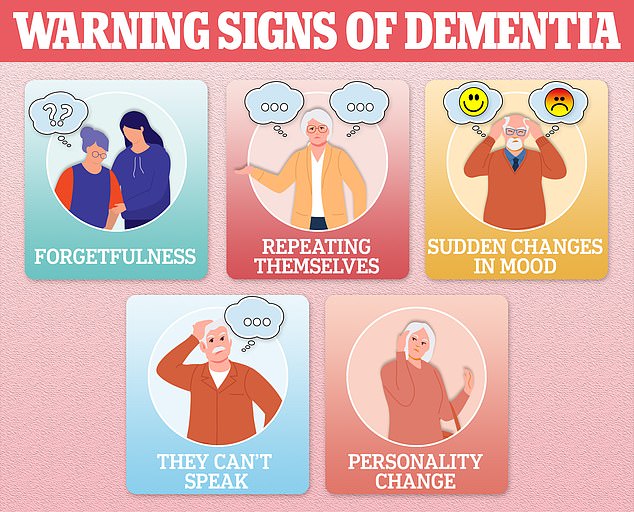Hearing aids reduce the risk of developing dementia, research shows
Wearing hearing aids may slow the onset and progression of dementia, new research suggests.
Although hearing loss can increase the risk of dementia by up to a fifth, research shows that the risk can be reduced by up to 7 percent if people who suffer from it use the devices.
Experts said this was further evidence of the link between hearing loss and dementia and stressed the need for hearing tests.
The study involved 573,088 people from Denmark aged 50 and ran from January 2003 to December 2017.
The team found that hearing loss was associated with a 7 percent higher risk of dementia.

A Danish study of more than 500,000 people found that people who had hearing loss and did not use hearing aids had a higher risk of dementia (stock image)
However, people who had hearing loss and did not use hearing aids had a 20 percent risk, compared to 6 percent among people who had hearing loss and used the devices.
Hearing loss has been suggested as a risk factor for dementia, researchers said, with possible factors including the reallocation of brain resources to process sound, impairing other cognitive processes, as well as a decrease in social interaction and stimulation due to hearing loss.
Researchers said the study results suggest that treating hearing loss with hearing aids may be associated with a reduced risk of dementia.
They added that this 'requires a better understanding of the association between hearing loss and dementia as a crucial step for the development of prevention strategies'.
Gill Livingston, professor of psychiatry of the elderly at University College London (UCL), said: 'The consistency of this evidence means this is very important in the real world.
'Prevention is more important than cure and being able to hear also improves functioning and quality of life without the toxic effects of medications.'
Dr. Leah Mursaleen, head of clinical research at Alzheimer's Research UK (ARUK), said the findings, published in the journal JAMA Otolaryngology – Head & Neck Surgery, add to the growing evidence that hearing loss increases the risk of dementia.
She said: 'Although the effects of hearing aid use are notoriously difficult to unravel because researchers cannot be sure whether people use them consistently, there is growing evidence that their use can help reduce the impact of hearing loss on the risk reduce dementia.
'Further research is needed to help us better understand this link, and with around one million people in the UK suffering from dementia and an estimated 12 million people living with some form of hearing loss, this has never been more important.'
The researchers say dementia and hearing loss are not an inevitable part of aging and that early intervention is crucial.
Alzheimer's Research UK has urged the government to include a hearing check in the NHS Health Check for people over 40.
“This could help millions of people identify hearing problems more quickly and potentially reduce the risk of dementia,” she added.


People who regularly read books, play musical instruments or keep a personal diary have a 23 percent lower risk of developing the condition


Many warning signs of dementia are often confused with normal aging. Common early symptoms include forgetfulness, repeating oneself, sudden mood swings, inability to speak and personality changes
Dr. Sarah Bauermeister, associate professor, senior scientist and senior data manager at Dementias Platform UK at the University of Oxford, said: 'Only by using such large longitudinal studies can we really begin to explore these causal relationships, which drive changes in the show over time.
'We need to understand the biological mechanisms of the association and it is still possible that it is due to associated factors, such as social isolation.
'However, future clinical trials are needed to understand the difficulties of wearing hearing aids in people with cognitive impairment and dementia, a focus of our own program of work at Dementias Platform UK (DPUK), funded by ARUK.
'Also, the importance of regular hearing assessments throughout adult life cannot be underestimated. Destigmatizing hearing aid use can also be an important outcome of regular testing.'
